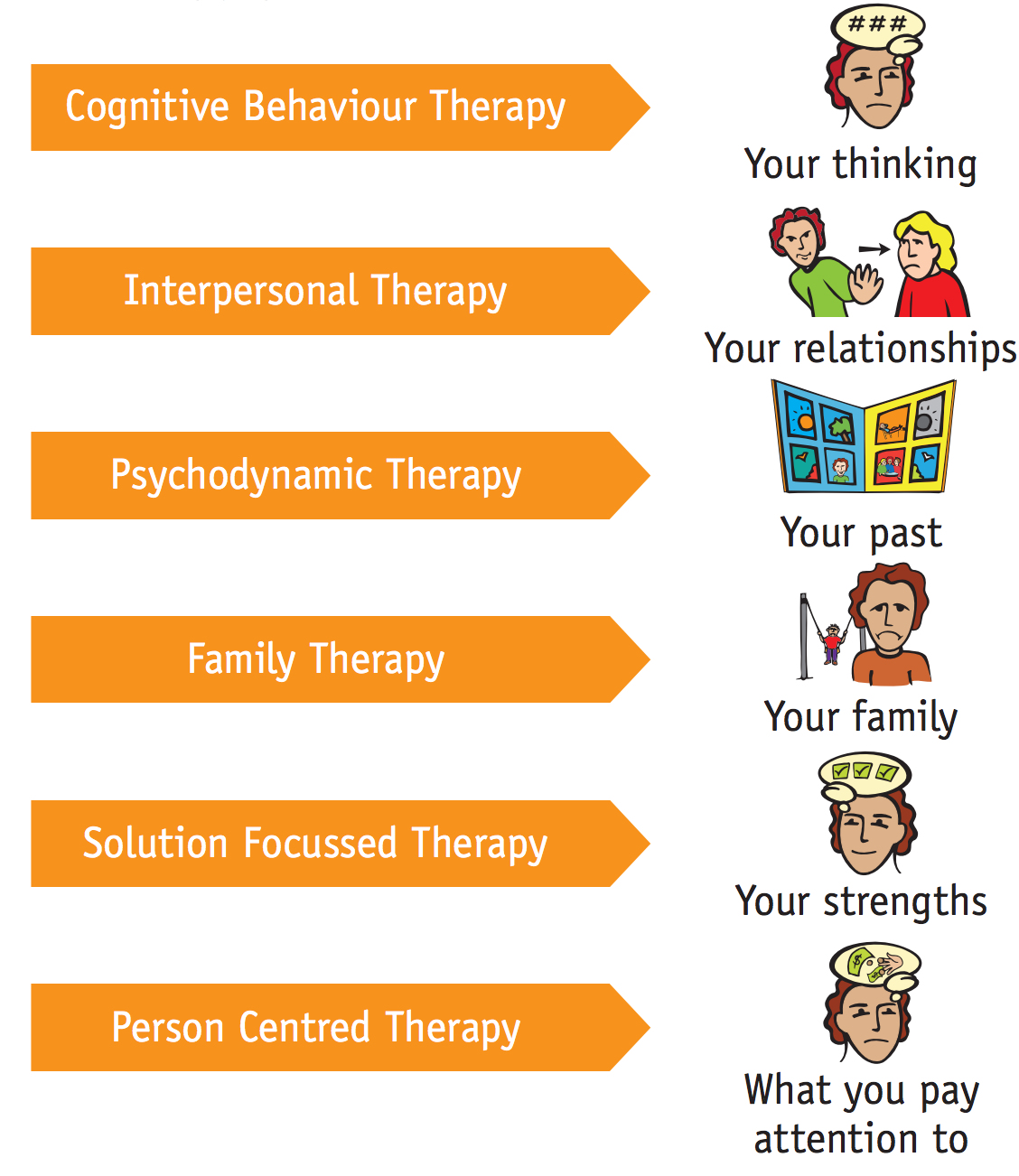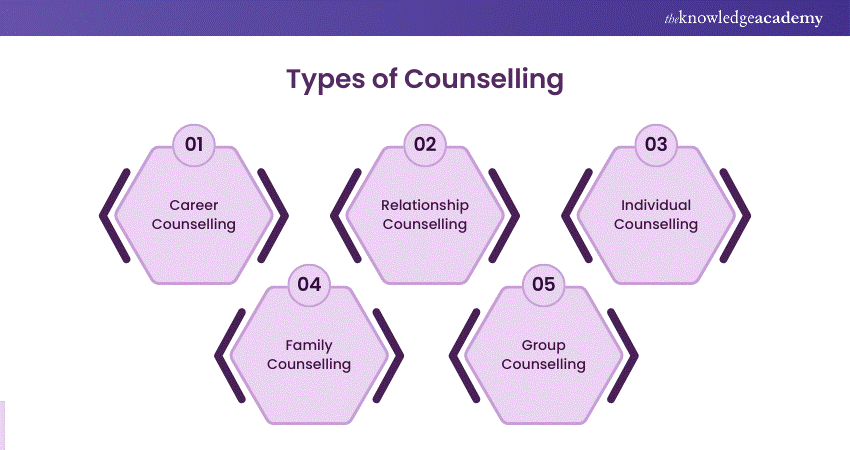virtual therapy sessions vs. Traditional Sessions: What’s Right for You?
Wiki Article
A Comprehensive Overview to the Numerous Kinds Of Counselling and Their Impact
Therapy encompasses a variety of restorative approaches, each created to meet special psychological health and wellness demands. From the structured strategies of Cognitive-Behavioral Therapy to the understanding nature of Person-Centered Treatment, these modalities provide distinct paths to individual development. Family treatment and Dialectical Habits Therapy supply additional structures for recovery, while team counseling promotes neighborhood support. Recognizing these diverse techniques can illuminate their profound influence on specific health. What continues to be to be explored are the details of each technique.
Understanding Cognitive-Behavioral Therapy (CBT)
Although lots of restorative methods exist, Cognitive-Behavioral Therapy (CBT) attracts attention because of its structured, goal-oriented nature. This kind of treatment is based upon the premise that thoughts, sensations, and behaviors are interconnected, and by altering adverse thought patterns, people can modify their psychological feedbacks and activities. CBT uses numerous methods, such as cognitive restructuring, which assists customers identify and test distorted beliefs. Behavior activation motivates interaction in pleasant tasks to fight anxiety.Normally, CBT is a temporary therapy, typically long-term between 12 to 20 sessions, making it accessible for those looking for quick results. Its effectiveness has been well-documented in dealing with stress and anxiety conditions, anxiety, and various other psychological health and wellness concerns. The therapist's role is to guide clients through workouts and research assignments, fostering self-awareness and promoting lasting coping approaches. This functional technique encourages people to take control of their psychological health, ultimately leading to improved life complete satisfaction.
Exploring Person-Centered Therapy
Person-Centered Treatment, created by Carl Rogers, uses a different method to Cognitive-Behavioral Treatment by stressing the customer's subjective experience. This restorative version focuses on the person's viewpoint, cultivating an atmosphere of compassion, unconditional positive respect, and credibility. By allowing customers to discover their sensations and ideas without judgment, therapists help with individual development and self-discovery.The core tenet of Person-Centered Therapy is the idea that individuals possess the fundamental capacity for self-healing and personal advancement. In this setup, the therapist works as a supportive guide instead of a directive authority, motivating clients to organize their very own journey. This strategy is particularly effective for those facing problems such as low self-worth, anxiety, or anxiety, as it encourages them to confront and understand their emotions. Eventually, Person-Centered Treatment grows a strong healing alliance, cultivating count on and visibility vital for meaningful modification.
The Duty of Family Treatment in Healing
Family members therapy works as a vital part in the healing process for individuals and their partnerships. This healing strategy focuses on boosting communication, resolving conflicts, and cultivating much deeper connections amongst member of the family. By resolving dysfunctional dynamics, family members therapy urges each member to reveal their thoughts and feelings in a safe environment, promoting understanding and empathy.
The effect of family members treatment extends past the sessions, as boosted connections can cause enhanced emotional health for all entailed. Generally, family treatment plays an important duty in healing by cultivating unity, resilience, and mutual assistance among relative, ultimately directing them towards a healthier, much more fulfilling life together.
Unpacking Dialectical Behavior Modification (DBT)
Structure on the structure of healing strategies that boost emotional health, Dialectical Behavior modification (DBT) uses a structured structure for individuals fighting with intense feelings and behavioral difficulties. Developed by Marsha Linehan, DBT incorporates cognitive-behavioral methods with mindfulness practices, intending to assist customers manage frustrating sensations and improve interpersonal performance.The therapy is particularly advantageous for those identified with Borderline look what i found Personality Problem yet is additionally relevant to a range of other mental health problems. low cost therapy. DBT contains specific therapy sessions and skills training teams, concentrating on four crucial skill sets: mindfulness, distress resistance, emotion policy, and social efficiency
The Advantages of Team Counselling Sessions
While specific therapy supplies beneficial understandings, team counseling sessions use one-of-a-kind benefits that can considerably boost the therapeutic experience. One important advantage is the sense of area that emerges amongst individuals. Individuals often locate comfort in sharing their experiences with others encountering similar obstacles, fostering a supportive atmosphere that decreases feelings of isolation.Team sessions urge diverse viewpoints, allowing participants to find out from each various other's coping approaches and understandings. This collective wisdom can lead to boosted problem-solving abilities and a more comprehensive understanding of individual issues.
In addition, team counseling usually advertises accountability, as members motivate each other to pursue their goals and follow their dedications. Lastly, the cost-effectiveness of group therapy makes it an accessible alternative for many individuals looking for assistance. On the whole, the collective nature of group counseling sessions can substantially improve the restorative trip.
Often Asked Inquiries
What Certifications Do Therapists Need to Practice Therapy?
Therapists commonly call for an appropriate level in psychology or counseling, together our website with monitored scientific experience. In addition, they have to obtain ideal licensure or certification to practice legally, making sure adherence to expert standards and moral standards.Just how Do I Choose the Right Kind Of Therapy for Me?
Choosing the right sort of therapy entails assessing individual demands, exploring different strategies, considering therapist specialties, and looking for recommendations. Understanding specific goals and choices can considerably boost the performance go to the website and complete satisfaction of the therapeutic experience.Are Online Counseling Procedure as Effective as In-Person Ones?
The performance of online counseling sessions contrasted to in-person ones often relies on private preferences and circumstances. Study indicates that both approaches can yield positive end results, though some might discover better comfort in face-to-face interactions.How Much Time Does Counseling Normally Last?

What Should I Anticipate During My Initial Therapy Session?
Throughout the very first counseling session, customers can anticipate an introduction, conversation of their issues, establishment of objectives, and an introduction of the therapy procedure - relationship therapy. This initial meeting intends to construct rapport and warranty comfortReport this wiki page